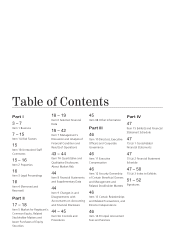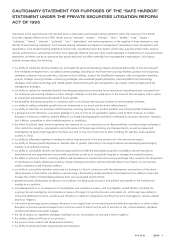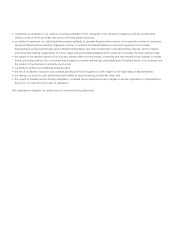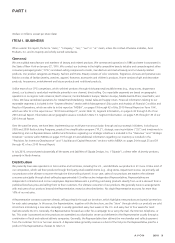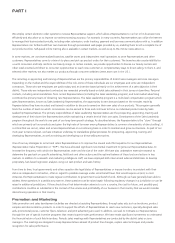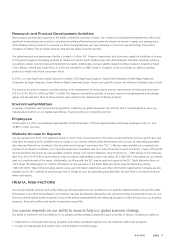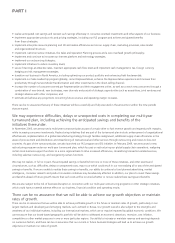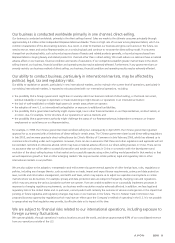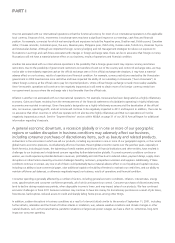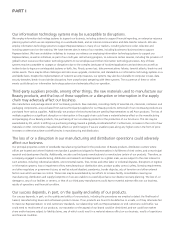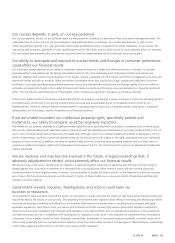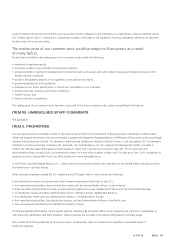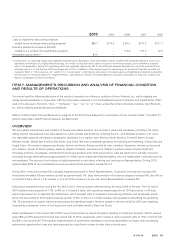Avon 2010 Annual Report Download - page 22
Download and view the complete annual report
Please find page 22 of the 2010 Avon annual report below. You can navigate through the pages in the report by either clicking on the pages listed below, or by using the keyword search tool below to find specific information within the annual report.PART I
One risk associated with our international operations is that the functional currency for most of our international operations is the applicable
local currency. Because of this, movements in exchange rates may have a significant impact on our earnings, cash flow and financial
position. For example, currencies for which we have significant exposures include the Argentine peso, Brazilian real, British pound, Canadian
dollar, Chinese renminbi, Colombian peso, the euro, Mexican peso, Philippine peso, Polish zloty, Russian ruble, Turkish lira, Ukrainian hryvnia
and Venezuelan bolívar. Although we implement foreign currency hedging and risk management strategies to reduce our exposure to
fluctuations in earnings and cash flows associated with changes in foreign exchange rates, there can be no assurance that foreign currency
fluctuations will not have a material adverse effect on our business, results of operations and financial condition.
Another risk associated with our international operations is the possibility that a foreign government may impose currency remittance
restrictions. Due to the possibility of government restrictions on transfers of cash out of the country and control of exchange rates, we may
not be able to immediately repatriate cash at the official exchange rate or if the official exchange rate devalues, it may have a material
adverse effect on our business, results of operations and financial condition. For example, currency restrictions enacted by the Venezuelan
government in 2003 have become more restrictive and have impacted the ability of our subsidiary in Venezuela (“Avon Venezuela”) to
obtain foreign currency at the official rate to pay for imported products. Unless official foreign exchange is made more readily available,
Avon Venezuela’s operations will continue to be negatively impacted as it will need to obtain more of its foreign currency needs from
non-government sources where the exchange rate is less favorable than the official rate.
Inflation is another risk associated with our international operations. For example, Venezuela has been designated as a highly inflationary
economy. Gains and losses resulting from the remeasurement of the financial statements of subsidiaries operating in highly inflationary
economies are recorded in earnings. Given Venezuela’s designation as a highly inflationary economy and the devaluation of the official
rate, our revenue, operating profit, and net income will continue to be negatively impacted in 2011 and beyond. In addition, there can be
no assurance that other countries in which we operate will not also become highly inflationary and that our operations will not be
negatively impacted as a result. See the “Segment Review” section within MD&A on page 31 of our 2010 Annual Report for additional
information regarding Venezuela.
A general economic downturn, a recession globally or in one or more of our geographic
regions or sudden disruption in business conditions may adversely affect our business,
including consumer purchases of discretionary items, such as beauty and related products.
A downturn in the economies in which we sell our products, including any recession in one or more of our geographic regions, or the current
global macro-economic pressures, could adversely affect our business. Recent global economic events over the past few years, especially in
North America, including job losses, the tightening of credit markets and failures of financial institutions and other entities, have resulted in
challenges to our business and a heightened concern regarding further deterioration globally. If current economic conditions continue or
worsen, we could experience potential declines in revenues, profitability and cash flow due to reduced orders, payment delays, supply chain
disruptions or other factors caused by economic challenges faced by customers, prospective customers and suppliers. Additionally, if these
conditions continue or worsen, any one or all of them could potentially have a material adverse effect on our liquidity and capital resources,
including our ability to issue commercial paper, raise additional capital or the ability of lenders to maintain our credit lines, and our ability to
maintain offshore cash balances, or otherwise negatively impact our business, results of operations and financial condition.
Consumer spending is generally affected by a number of factors, including general economic conditions, inflation, interest rates, energy
costs, gasoline prices and consumer confidence generally, all of which are beyond our control. Consumer purchases of discretionary items
tend to decline during recessionary periods, when disposable income is lower, and may impact sales of our products. We face continued
economic challenges in fiscal 2011 because customers may continue to have less money for discretionary purchases as a result of job losses,
foreclosures, bankruptcies, reduced access to credit and sharply falling home prices, among other things.
In addition, sudden disruptions in business conditions as a result of a terrorist attack similar to the events of September 11, 2001, including
further attacks, retaliation and the threat of further attacks or retaliation, war, adverse weather conditions and climate changes or other
natural disasters, such as Hurricane Katrina, pandemic situations or large scale power outages can have a short or, sometimes, long-term
impact on consumer spending.


